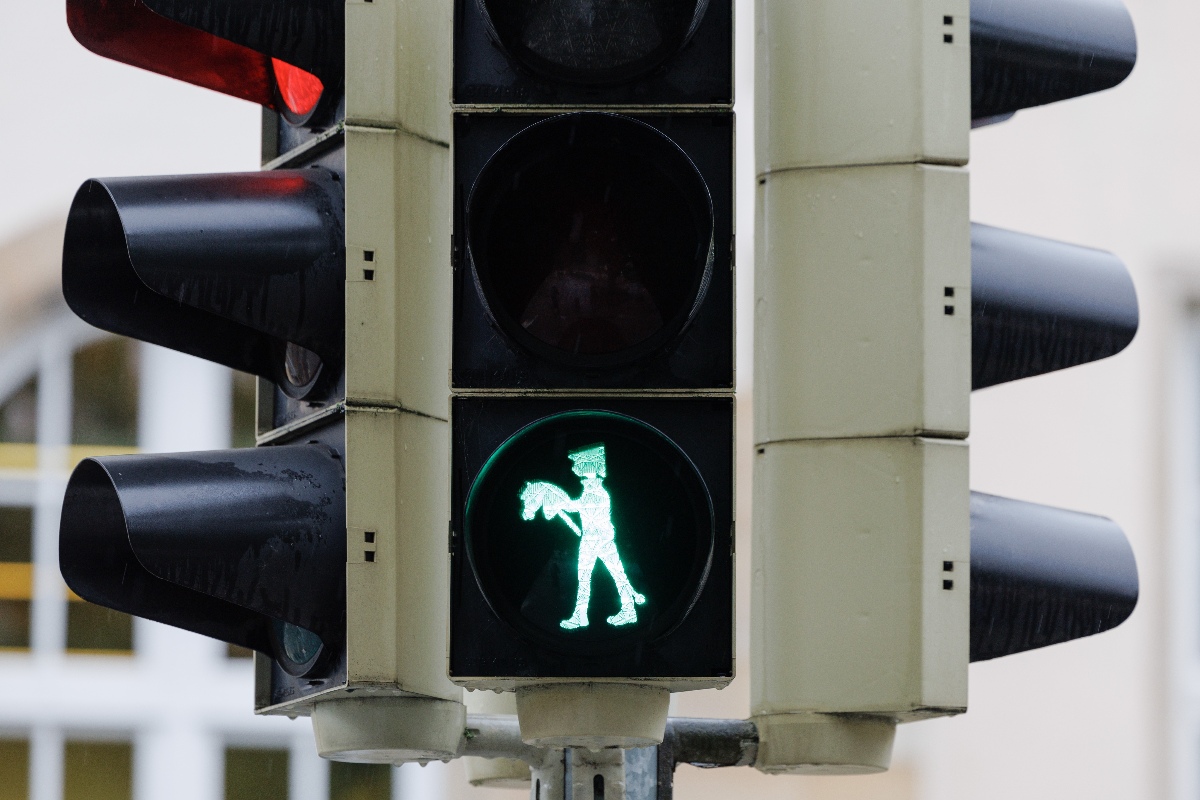Living in Germany: A Fischbrötchen incident and are German immigration offices fit for purpose?

In this weeks' roundup we talk about the problems with Germany's immigration offices, the French President trying Fischbrötchen, a hobby horse ride and superstitions.
Living in Germany is our weekly look at some of the news and talking points in Germany that you might not have heard about. Members can receive it directly to their inbox on Saturday.
Can Germany modernise its immigration offices?
Germany’s skilled worker immigration law has been approved and will be brought into law in phases, starting next month. But as immigration lawyer Sven Hasse told the Local’s Germany in Focus podcast this week, a lot of work has to be carried out to get the Ausländerbehörden up to scratch. People using the offices across Germany report major delays in services, with many having to queue for hours or even overnight to get appointments. Experts say it’s down to staff shortages in the offices and a lack of digitalisation. “Bureaucracy is the biggest issue,” said Hasse. “We have to say that we see a lot of dysfunctional immigration authorities in Germany, you have a lot of waiting times for visa appointments and unanswered emails in inboxes. So depending on the authority, some say we have 30,000 unanswered emails, and you can't get in contact with them. And the reason is - they have a shortage of skilled workers. And that is the biggest problem. I don't see that the change in law changes this problem.”
Hasse recommended that effort be put into “strengthening the capacity of the authorities” so they are able to cope with the number of applicants, which will only get larger after the laws change. “This is the biggest issue and this is the biggest problem skilled workers face and there is not really a remedy,” said Hasse. “So I think the legal situation is not so bad. But the authorities are not very well equipped to handle the applications.”
Tweet of the week
We’ve been loving the memes coming out of French President Emmanuel Macron’s trip to Hamburg to meet with German Chancellor Olaf Scholz. The winces on their faces as they chowed down on Hamburg’s speciality Fischbrötchen (fish roll) said it all.
This tweet reads: ‘How a few Hamburg Fischbrötchen endangered the Franco-German friendship’
Wie ein paar Hamburger Fischbrötchen die deutsch-französische Freundschaft gefährdeten. pic.twitter.com/uH6o9WsMFN
— Hanna Herbst (@HHumorlos) October 10, 2023
Where is this?

Photo: picture alliance/dpa | Friso Gentsch
If you live in Osnabrück you may have spotted a pedestrian traffic light with an image of a person on a hobby horse. The move is in tribute to the city’s annual hobby horse ride to mark the Treaty of Westphalia in 1648. Every year since 1953, primary school pupils gather on or around October 25th – the day when peace was declared – and ride their hobby horses to the Rathaus.
Did you know?
Friday the 13th just passed so it feels like a good time to discuss some German superstitions. One that you might need if you’re heading to meet friends out this weekend is that whenever you arrive at a pub or bar, you should always knock twice on the table. Why? To show your friends that you aren't the devil! According to legend, the Stammtisch, the regular's table in the tavern, was traditionally made of oak which the devil was unable to touch as the tree was holy. Knocking on the table proved you weren't the devil in disguise.
If you’re in need of some luck yourself then why not take a tip from the Germans and purchase a pig (anything shaped like one will do). A Glücksschwein or ‘lucky pig’ is said to be a sign of prosperity and wealth. At new year you’ll often find them in marzipan form. Touching a chimney sweep (Schornsteinfeger) is also considered lucky in Germany as their services have historically meant people could cook food again after having blocked chimneys and also reduced the risk of the house burning down. If you get ash from a chimney sweep in your face, it's considered lucky.
Comments
See Also
Living in Germany is our weekly look at some of the news and talking points in Germany that you might not have heard about. Members can receive it directly to their inbox on Saturday.
Can Germany modernise its immigration offices?
Germany’s skilled worker immigration law has been approved and will be brought into law in phases, starting next month. But as immigration lawyer Sven Hasse told the Local’s Germany in Focus podcast this week, a lot of work has to be carried out to get the Ausländerbehörden up to scratch. People using the offices across Germany report major delays in services, with many having to queue for hours or even overnight to get appointments. Experts say it’s down to staff shortages in the offices and a lack of digitalisation. “Bureaucracy is the biggest issue,” said Hasse. “We have to say that we see a lot of dysfunctional immigration authorities in Germany, you have a lot of waiting times for visa appointments and unanswered emails in inboxes. So depending on the authority, some say we have 30,000 unanswered emails, and you can't get in contact with them. And the reason is - they have a shortage of skilled workers. And that is the biggest problem. I don't see that the change in law changes this problem.”
Hasse recommended that effort be put into “strengthening the capacity of the authorities” so they are able to cope with the number of applicants, which will only get larger after the laws change. “This is the biggest issue and this is the biggest problem skilled workers face and there is not really a remedy,” said Hasse. “So I think the legal situation is not so bad. But the authorities are not very well equipped to handle the applications.”
Tweet of the week
We’ve been loving the memes coming out of French President Emmanuel Macron’s trip to Hamburg to meet with German Chancellor Olaf Scholz. The winces on their faces as they chowed down on Hamburg’s speciality Fischbrötchen (fish roll) said it all.
This tweet reads: ‘How a few Hamburg Fischbrötchen endangered the Franco-German friendship’
Wie ein paar Hamburger Fischbrötchen die deutsch-französische Freundschaft gefährdeten. pic.twitter.com/uH6o9WsMFN
— Hanna Herbst (@HHumorlos) October 10, 2023
Where is this?

If you live in Osnabrück you may have spotted a pedestrian traffic light with an image of a person on a hobby horse. The move is in tribute to the city’s annual hobby horse ride to mark the Treaty of Westphalia in 1648. Every year since 1953, primary school pupils gather on or around October 25th – the day when peace was declared – and ride their hobby horses to the Rathaus.
Did you know?
Friday the 13th just passed so it feels like a good time to discuss some German superstitions. One that you might need if you’re heading to meet friends out this weekend is that whenever you arrive at a pub or bar, you should always knock twice on the table. Why? To show your friends that you aren't the devil! According to legend, the Stammtisch, the regular's table in the tavern, was traditionally made of oak which the devil was unable to touch as the tree was holy. Knocking on the table proved you weren't the devil in disguise.
If you’re in need of some luck yourself then why not take a tip from the Germans and purchase a pig (anything shaped like one will do). A Glücksschwein or ‘lucky pig’ is said to be a sign of prosperity and wealth. At new year you’ll often find them in marzipan form. Touching a chimney sweep (Schornsteinfeger) is also considered lucky in Germany as their services have historically meant people could cook food again after having blocked chimneys and also reduced the risk of the house burning down. If you get ash from a chimney sweep in your face, it's considered lucky.
Join the conversation in our comments section below. Share your own views and experience and if you have a question or suggestion for our journalists then email us at [email protected].
Please keep comments civil, constructive and on topic – and make sure to read our terms of use before getting involved.
Please log in here to leave a comment.